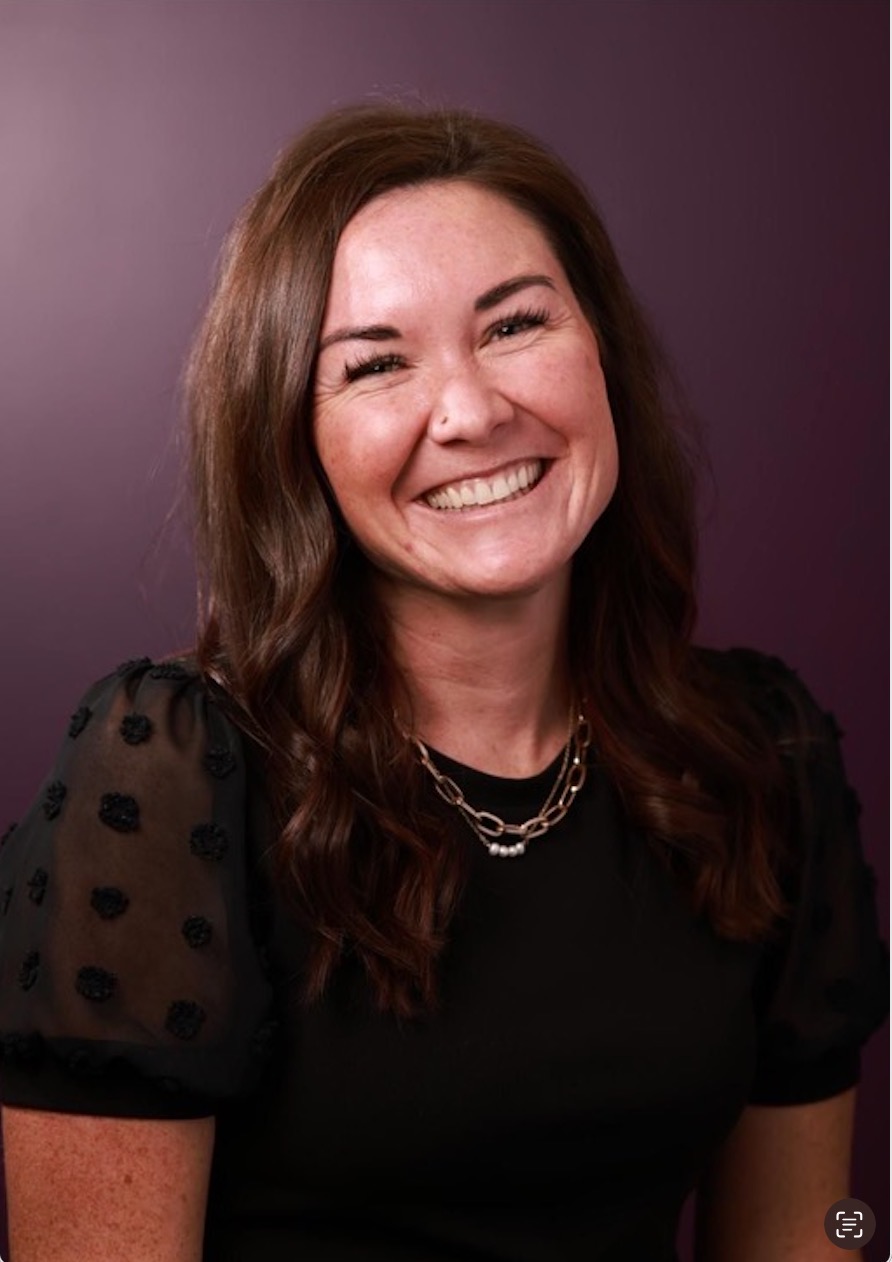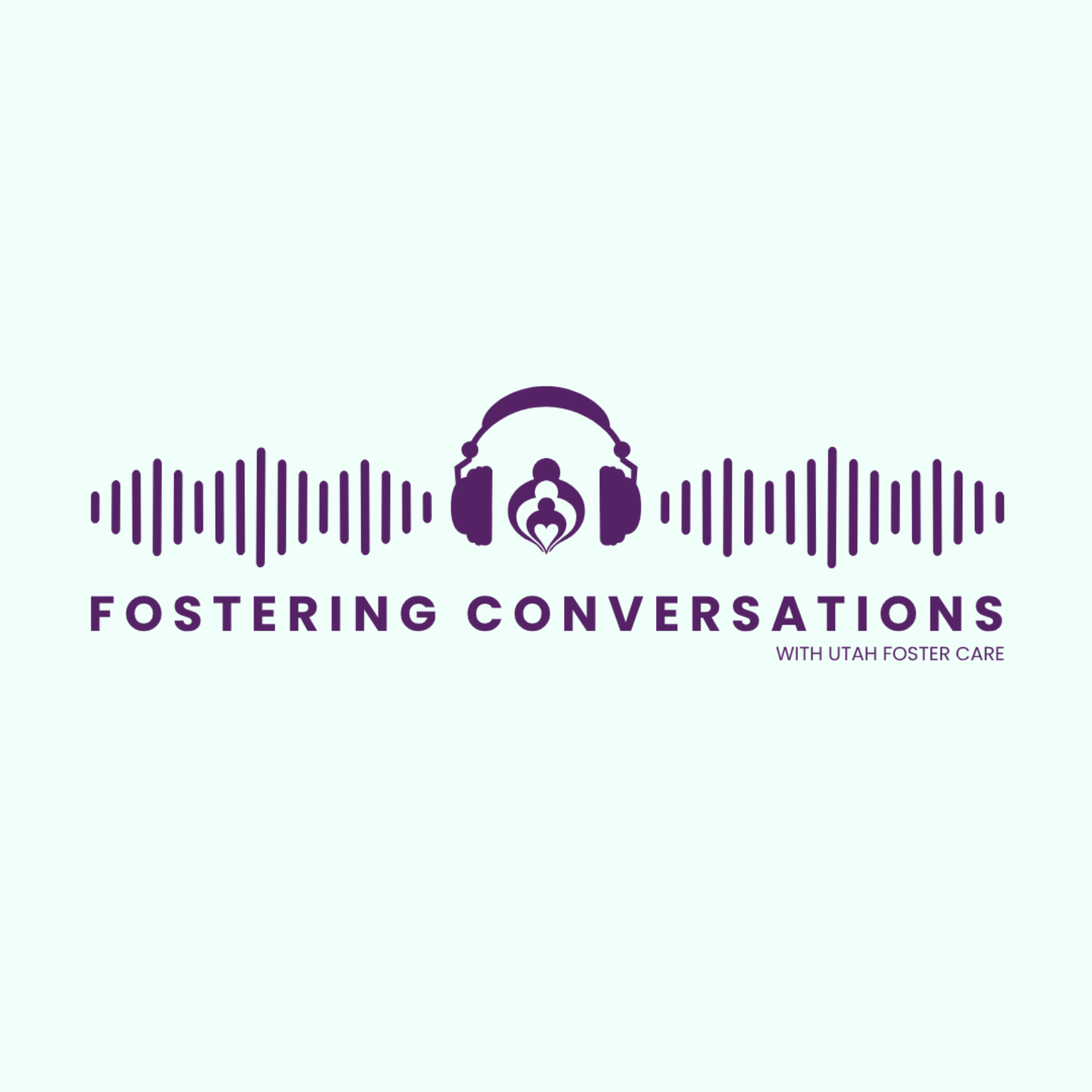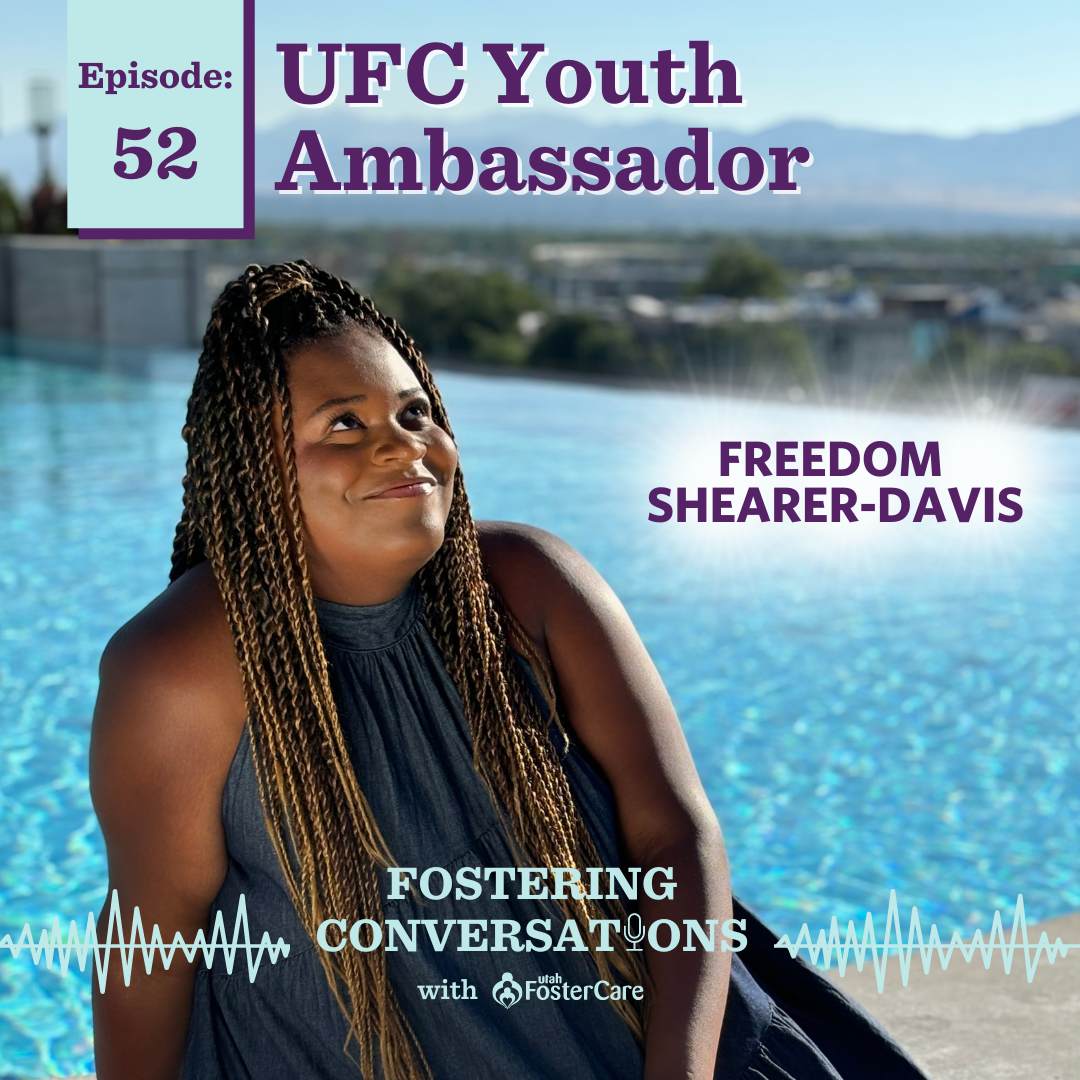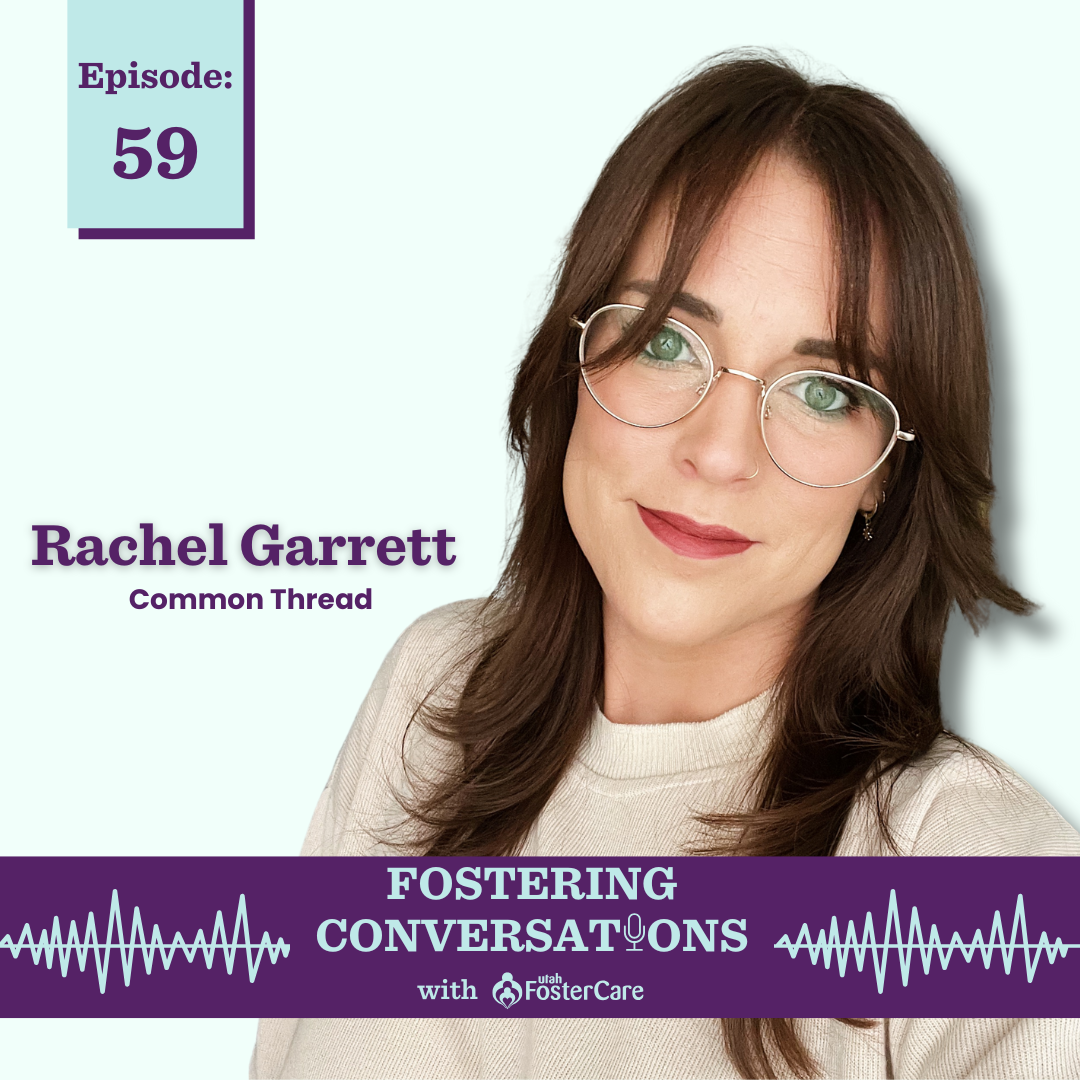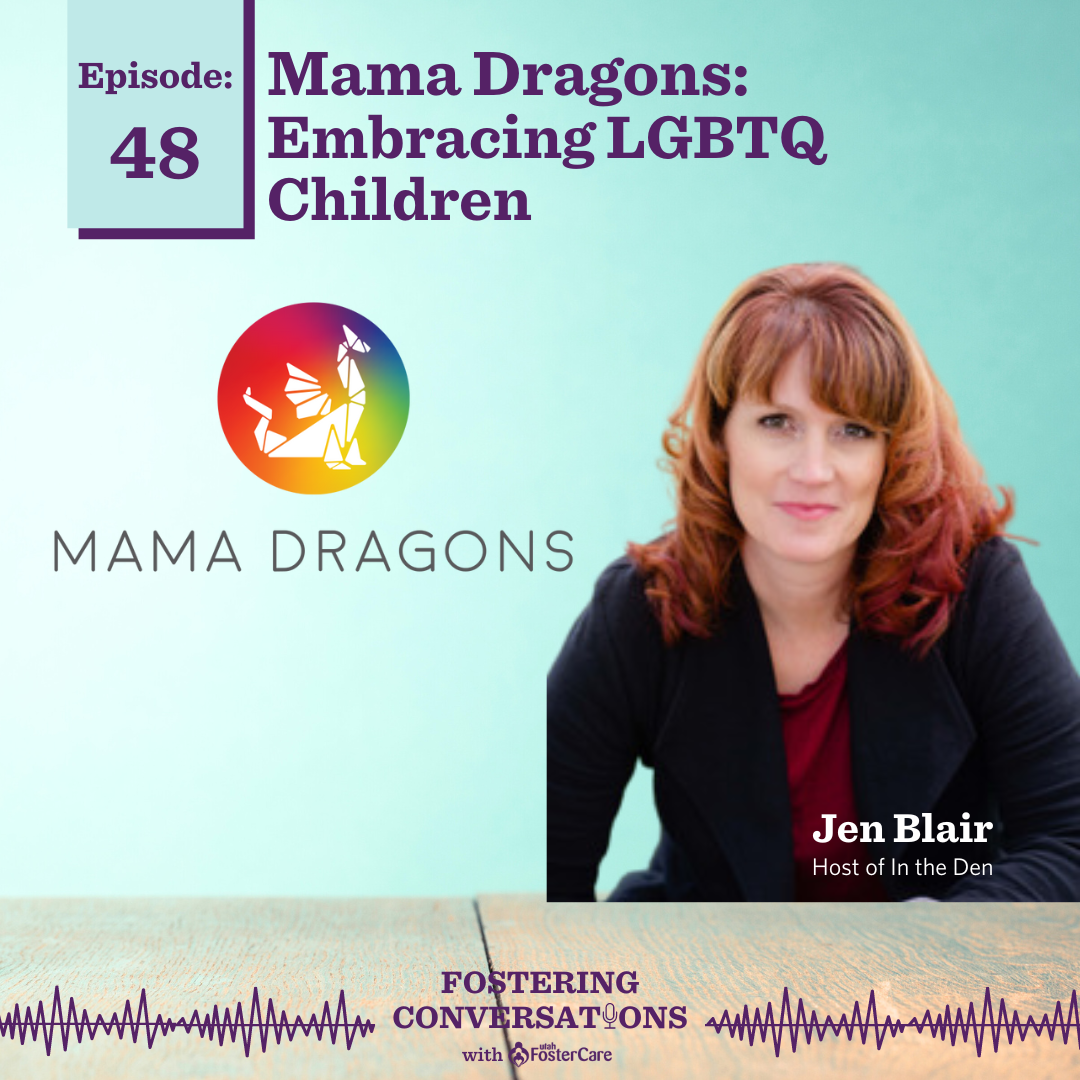Episode Transcript
[00:00:01] Speaker A: This is Fostering Conversations with Utah Foster Care, where we have insightful conversations about parenting for bio foster, adoptive or blended families to better understand the experiences we all face as families.
Welcome Utah families out there. Thanks for joining us. Don't know if you're listening to this before Thanksgiving, after Thanksgiving, in between the holidays, or maybe even on Christmas Eve, but my family and I always approach this time of year with equal parts of anticipation, but also a little apprehension. And this year, some people may be thinking about it even with a little bit of dread. And that's because for many of us, we have the prospect of a very different holiday season for foster families. However, Thanksgiving, Christmas, Hanukkah, Kwanzaa, whatever you celebrate have always been a time of mixed emotions for the children in foster care who are in their homes, who are missing their families that they are separated from.
And that separation anxiety, or whatever you want to call it, has been heightened by the ongoing COVID 19 pandemic because it's keeping us all apart at a time of year when we crave being close to family.
I'm Deborah Lindner and I'm joined now by my colleague Liz Rivera, Director of Education with Utah Foster Care. Liz, we found out just now that our podcast has been downloaded more than 560 times. That is so wonderful.
[00:01:46] Speaker B: We're so excited that the goal, of course, of creating this podcast was creating something that would be a tool and a use for foster and adoptive families and really families in many situations. So we're excited that so many are listening.
[00:01:59] Speaker A: Wonderful. Well, let's dive in and I'll let Liz introduce our guests.
[00:02:04] Speaker B: We are so excited today to have Dan Canterlore and Hope Nichols from Hope and Healing Counseling. We do quite a bit of partnering with Hope and Healing and they're a wonderful resource to families in the Salt Lake area and the Tooele area. And I know they're looking at expanding, so we're so grateful to have them with us. So Dan is an Associate Clinical Mental Health counselor who's been with Hope and Healing since May of 2019. He's worked in the mental health field since 2008 with experience in outpatient, day treatment, residential and wilderness treatment settings. He graduated from Westminster College with his Master's degree in Mental Health Counseling in May of 2020. Congratulations. That's made 2020 a little bit better year for you. Dan utilizes Trust Based Relational Intervention, or tbri, Interpersonal Processing, psychodynamic psychotherapy and interventions based upon theraplay principles to assist clients in working through challenging emotions and experiencing and experiences building self awareness and insight and trying out new ways of engaging and connecting relationally. In his free time, Dan enjoys spending time with his family and planning his next exciting adventure in the outdoors. So Utah's a good place for you. Welcome Dan. I'd like to take a minute to introduce Hope as well. Hope Nichols is an associate clinical mental health counselor who's been with Hope and Healing since January of 2016. She graduated with her master's in Clinical Mental Health counseling from Westminster. Before becoming a mental health counselor, Hope was a teacher and taught preschool, elementary school and middle school, which is always a big deal. I always have great admiration for middle school teachers. She has also worked in a variety of mental health settings, including a residential treatment facility for teens and a psychiatric hospital for adults. Hope works with children, teens and parents and utilizes attachment theory, play therapy, psychodynamic psychotherapy, and TBRI to help clients process and regulate their emotions, build self awareness, and foster a strong attachment between parent and child. Hope believes that the therapeutic relationship is an important factor in the success of therapy as well as working with both the parents and the child to create a secure attachment and heal attachment wounds. In her spare time, Hope enjoyed playing with her two boys, cooking, hiking, camping and playing softball. So, as you can see from these introductions, Dan and Hope are well qualified to join us today as we talk about some of the issues that come up around the holidays. Thank you and welcome.
[00:04:32] Speaker A: Starting off, people think of the holidays as being very joyful, but it can be stressful, right, Hope?
[00:04:39] Speaker C: Yes, I think the holidays are really fun, but they're also really demanding of our time. Often it's a huge financial strain for families around this time. There's a lot of increased social interactions which can create a lot of busyness and being out of your routine and that can be stressful and exhausting.
[00:05:01] Speaker A: And we want to remind families listening out there. Utah foster care does offer some help throughout the state in providing gifts for children in foster care. So if you're listening and you haven't put in your name for the Giving Tree or other programs in your region, please do what's it like knowing you have a child in foster care who is celebrating the holidays? What do foster parents need to know?
[00:05:28] Speaker C: I think good things to know about kids in foster care. They for some of these kids, it's not an exciting time of year. It's a very sad and triggering time of year, but also exciting. And so that can be really hard for these kids and their foster parents to navigate. They can have really big behaviors, really big emotions I think that can be hard for parents to figure out what's going on with the child and how to help them, especially if they're new to their home and they don't know them as well as maybe a child that's been in their home longer.
[00:06:01] Speaker A: And they may have some very different past experiences with the holidays. What are some of the things that may have happened in their own families around the holidays?
[00:06:11] Speaker C: I think a lot of them may have experienced hard times during the holidays. Maybe they didn't really experience the holiday. They knew it was a special time, but their family didn't do anything special. I think another important detail is that there's a lot of markers around the holiday. There's a lot of like it's cold, there's snow, there's Christmas decorations, there's things that stand out to the brain during those times. And so sometimes if they experience really hard times with their biological families, then there's a marker to go with it.
[00:06:47] Speaker B: Or even good times and it reminds them of missing them and losing them. And you spoke to the idea of ambivalence, which I think is something that we as adults struggle with and certainly kids do, where we can feel more than one way and sometimes competing ways about one thing. And I think you've spoken really well to that idea that it's difficult to manage all the emotions and sometimes competing emotions around the holidays. So what are some ideas to help manage those expectations that maybe are too high, too much or expectation maybe that things are going to be worse than they really are going to be? What are some ideas about managing those expectations?
[00:07:25] Speaker C: I think deciding what's really important for your family, what traditions, what social events, which that's different during COVID But I think deciding what's most important to you and letting go of those things that aren't important, that might just make it more stressful or maybe lowering your bar. So maybe this year instead of making homemade cookies, you go buy store bought ones because that would still keep recurring the tradition, but make it more manageable. If you have a child that's experiencing really big emotions during this time from being away from their biological family, but also being excited about Christmas, I think also setting good boundaries. Boundaries are limits you put into place that protect you and your child. So if you know that your child can only handle 20 minutes of one holiday party, then you go for 20 minutes and you leave and it's okay because that's what's best for your child.
[00:08:25] Speaker B: It sounds like you're talking about setting expectations in a way that allows the parent to be more available for the child and to help the child manage the struggles and maybe the excitement that they have around the holidays.
[00:08:38] Speaker C: Yes.
[00:08:39] Speaker A: Is it a good idea also hope, to let your extended family in on that, knowing that maybe. I don't know if they'll be able to go to grandma's house this year, but maybe when they go, that if you need, you may need to leave early.
[00:08:55] Speaker C: I think that's a great idea. Is to let your family know of any boundaries or limits you're setting to help your child cope with whatever it is that you're planning. And so that family member doesn't feel like it's personal.
There's a lot of stimulation around these events. And so letting your family know that it's not to do with them, it's to help the child manage.
[00:09:17] Speaker A: Great advice. And one of those emotions that sometimes comes up, as you mentioned, is grief.
And tell us how grief can intrude on what we think of as a joyous celebration.
[00:09:32] Speaker D: I was thinking of grief. And grief catches us off guard. Grief does not honor time. It doesn't honor routines, it doesn't honor schedules. It just shows our oftentimes without us anticipating. And it can create anxiety. But it's also an important guess because it helps us to work through some of those situations from the past. Some things I'm just thinking of with grief inspiration, it may show up and the child is feeling something. And the difficult part is they may not know exactly what they're experiencing. And as a parent, you don't know what they're experiencing either. And that's challenging. And thinking of like, it's almost like being startled, being caught off guard or surprised. And if we can think of that time of being surprised or being startled, like someone comes around, just oh. Or just startles us. There's a couple things that happen. Either we take a deep breath in and just hold it, or we just blast it out, which might be a scream, a yell, anger. Some people, when they get surprised, they almost have aggression. And both responses, either breathing in, just holding that fear inside, or blasting them out, they end up isolating us from other people oftentimes. And that may bring shame as well. And so just knowing that grief may come similar to what Hope was saying, to have time, to have scheduled in time for that connection, time to be attuned and to attune. First of all, as a parent, to be able to attune to ourself, to be able to notice what's going on for ourselves and then to Be able to return to child, the foster child, the adoptive child, whoever that is that's struggling in that moment. Oftentimes speaks in a language that it's hard to understand. It's hard for the child to understand. It's. It's hard for the adult to understand who's trying to attune to that child.
And so how do we engage a person who's speaking like a foreign language or a lesser known language? I think of getting down to their level. I think of paying attention to their body, paying attention to their words, really working hard to try to understand, not arguing facts whether that actually happened or the way that it happens, but to acknowledge and to create space and letting the child leave. Sometimes they might not have the words or be able to identify the emotions, and that's okay, but it's important just to create the time and create the space and to listen.
[00:12:10] Speaker A: Are there different behaviors you might see depending on the age of the child, whether or not you're dealing with a young child or even a teenager?
[00:12:19] Speaker D: I think that there will be behaviors, but it could be a whole spectri behaviors. When I think of grief or trauma, neglect, stress, those are all experiences we hold in our body. And so because of that we have a cognitive understanding in our mind, but we also have a bodily experience or affective experience of them. So for some kids, maybe they externalize those behaviors. Some kids they internalize. So going into that like an externalized behavior would be like that angry outburst or maybe more conflict with siblings, or just getting real critical or picking at little things that don't really matter, or maybe seeking out attention from an adult or from other people, or maybe be more clingy. But then there's the internalizing behaviors, and those can be harder to see. Those might be like in isolating or maybe avoiding, maybe being excessively tired. Or it can come about in like body discomfort, like headaches, body aches. We don't want to ignore that. There may be a medical aspect. It can also be trauma or grief making its way through our body.
Sadness, silence, maybe vigilance, like just noticing, paying attention to all the stuff around us that gives a lot of different responses. To sum it together would be what moving away from a child's baseline or what their norm is. And when we notice that, that might be an indicator of, oh, there's something going on right now, there's some sort of distress that's going on whenever there's a situation that seems small, but the response is really big. The two don't match. That can be included as well. Kind of something that we come back to when talking with families is when words don't work, then we use behavior. And it's not that words don't work because it's utility. It may just be we don't have the words. Behavior is communication. So we have an opportunity as the caretakers. And it's difficult but to try to understand what is being communicated by the behavior and go, that just keeps going back to time and having the time to do that to help our child be able to get back into their space where they can think when they feel really disregarded.
[00:14:46] Speaker B: So we talked a little bit ago about expectations, and I'm wondering about even with grief and even articulating with kids that whether it's the first holiday season in your family or maybe the fifth, maybe they've been adopted and they're there. But to talk about just articulating holidays can be sad and you might feel sad, and that's okay. So we start to maybe proactively give them some warning, some language, so they're not maybe as surprised by their own grief. I wonder if that might be something we could do as well.
[00:15:19] Speaker D: And I think that makes a lot of sense. And being able to do that pre entrancy, I think, is what you're mentioning, because it going back to how grief catches us off guard. Oftentimes in the moment when that topic is first brought up, the child may not be able to process it, but that doesn't mean that they're not listening, and it doesn't mean that they're not taking advantage. It just means their body needs time. Whatever occurred with their body took place over time and may have gotten locked into their body because they weren't able to process it in that moment. But kids will usually have the opportunity when we kind of initiate that, that tells them that it's safe. This topic is safe. Sadness is safe, disappointment, whatever emotion that may be, and then having the opportunity to bring it back up later. But I think you're right. I think sometimes parents have to initiate that, otherwise it might not come out.
[00:16:11] Speaker B: So earlier Hope, you talked about, you know, stimulation and you talked about people and activity and routines being disrupted and, you know, all that stuff that can come along with a holiday. And then going back to even what Dan was talking about, that, you know, trying to distinguish is this grief stuff, is this overstimulation stuff, is this out of routine stuff, and maybe it's a combination of that, but maybe some ideas about managing that additional stimulation and disruption that kids may Deal with. And we too, as over the holidays.
[00:16:40] Speaker C: Yeah. I think one way to help set up the child and parent for success is to prep the child, prep them with the schedule. What's going to be different? Kids are really sensitive to routine changes, schedule changes. Excitement, just the excitement alone sometimes is overstimulating for them. They may get less sleep, they may eat differently because they're eating dinner at a party and there's people everywhere and so they didn't get enough food. So I think prepping them before you do anything that's different, telling them what's different, how the schedule is going to be. If they're a younger child, you may need to use pictures for schedule for that week.
Just as much prep as you can get them or advance warning of what's going to happen helps them be able to predict what the expectation is and what's going to happen. And I think that sets them up for a lot more success and helps them manage their own anxiety about this new situation. I think another helpful thing is setting up good boundaries to help protect them. So know, if you know that one child can be at the party for 20 minutes and the other child can be there for two hours, maybe you take two cars and you tell the child, we're going to go, we're going to eat some food, we're going to open a present. And then me and you, we're going to leave and go home and do this, and your brother and your dad are going to stay there and do this. And prepping them for that is helpful, getting as much prep as you can do.
[00:18:13] Speaker A: What about also preparing your bio children?
[00:18:18] Speaker C: Yeah, I think children, bio children, children without trauma, are just as susceptible to overstimulation. In fact, I think it's just a good expectation to have that all your kids at some point leading up to the holidays and on the holiday itself are probably going to have a meltdown at some point. And it's just inevitable because their little bodies hold all of this stimulation and excitement and sadness and anxiety. And at some point it's just going to all come out. And so I think knowing that's going to happen at some point is helpful so then you're not blindsided by it.
[00:18:55] Speaker B: Once again, that clear expectation, the better our expectations are, the better things go. And I really like the phrase you use to protect the kids, that as wonderful as the holidays can be, our first goal is the wellbeing of the kids. And you spoke to this much earlier when you talked about deciding on what matters the most and letting everything else go. And I think that's always great advice.
[00:19:17] Speaker C: Another thing I forgot to add in talking about that is the kid, especially if they're in foster care, they may have traditions from their biological family that are important to them. And I think asking them what things are important to you around the holidays, what would you like to bring into our family and do with us? And bringing those in might help them also with any grief they're having around being separated from their bio family.
[00:19:44] Speaker B: Absolutely. And it's a way to enrich your family too, you know, with the traditions of another family and show that child that their family of origin is important.
[00:19:52] Speaker C: Yeah.
[00:19:52] Speaker B: Thank you. So Deborah mentioned this briefly in the introduction, but we are in unprecedented times with this pandemic. And right now, of course, the cases are not going well. And so we're being advised to really limit our social, our in person social interactions. What thoughts do you have around now? All of this stuff around the holidays anyway. And now we had Covid on that. And the grief and the disappointment and the all of that may be heightened. Any advice you have for families in general and certainly families who foster and adopt during this time.
[00:20:26] Speaker D: Covid has really changed so much, so much of our lives, so much of what we do on a daily basis, and so much in the holiday timeframe. Just anticipating that as well. And I don't think of anticipation. I also think of anxiety.
So even before we get to the holidays, there may be anxieties.
We as parents are having them and our children are going to be having them as well. And so we're taking the time to go into and to unpack and try to understand some of those anxieties as well. And knowing that Covid will change how we celebrate. Now, something we've been thinking about too is there's going to be some negatives. We definitely tend to see that. But there may be some positives with COVID as well. I'm thinking Mahope was talking about some of the boundaries and the expectations that may create a space where we're not going out and spending time with a bunch of extended family or having, you know, 10 different parties of different friends that we have to go to. That feels very disregulating for these little ones. So noticing how Covid will change, having dialogue in our families about that, we need to be talking about, cope it's happening, whether it's being talked about, it is being experienced, but also trying to do some positive things with it too. And so something I'm thinking of is that traditions are important and there Will be some traditions that are lost. But that also creates an opportunity for new traditions within family, Something that we can look forward to. So hope meshins traditions, maybe from the foster kids, from their biological families, having those dialogues and having men away that were being gentle, soft, kind that were leaving sufficient time for that conversation. Having traditions that are part of the family who is adopting, who is fostering and introducing nurse to their foster kids. One thing I was thinking of as well is even if a tradition is brought in and something that the foster kids bring from their family, it may still bring up grief for them. There may still be some sadness or some unanticipated even if they are loving doing that tradition. And that's so exciting. And then suddenly there's tears. There's a heaviness that we don't fully understand. So just making sure in those moments that we're able to take that in as well and be able to work to make sense of that. Even fun changes or transitions can be dysregulated. Something that we talk about here is cortisol, the stress hormone. It is exerted both with excitement and with stress. So something that is like, ooh, it's just so exciting versus, oh, my goodness, I'm so stressed out. It's still giving off that same stress one. So just being aware of that as well.
[00:23:17] Speaker A: Also, as a parent, I must say that I've had some stress always around the holidays. So it's important to recognize what you're experiencing, too. Recognize when you're getting in that zone where maybe you have to go in your room and do some deep breathing.
[00:23:34] Speaker D: It's so important for us to take care of ourselves. You know, say on the airplane, you take care of your own oxygen mask, and then you take care of the oxygen mask of the people next to you. And I think that applies in so many situations. We take care of ourselves and while thinking of how we're going to be taking care of our job.
[00:23:52] Speaker B: So I just would like to say that I think if I were a foster parent, I'm going to send my top three things in that I learned. I would probably say lower the bar and communicate clearly about the prospect of grief, of schedule changes and routine changes. And then finally what Dan talked about with COVID Even though there's loss and disappointment because we may not be able to continue all of the traditions we've developed over the years and see all the people we love, it's an opportunity to build new traditions and to find new opportunities in this difficult time.
[00:24:25] Speaker A: Preparation is key.
[00:24:28] Speaker B: Yes. I think so.
[00:24:30] Speaker A: Well, it's time to wrap up our conversation. It was a good one and we want to thank everyone who's tuned in who's loved to review, especially our foster families. And if you know of another foster family who may benefit from this conversation, please let us know about our podcast and have them leave a review as well. Thanks again to Foster Families for caring for children who have been traumatized. We want to wish you all a holiday season filled with fun, joy, and hopefully healing for all.
This has been fostering Conversations with Utah Foster Care. Thank you for joining us. For more information, go to Utah fostercare.org We'll see you next time.
